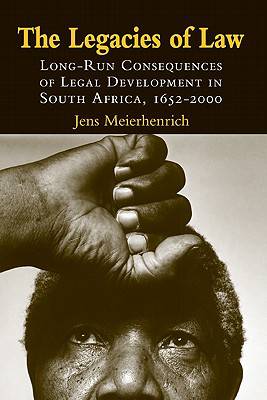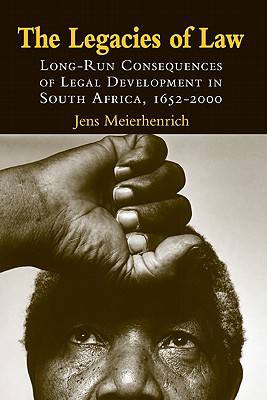
- Afhalen na 1 uur in een winkel met voorraad
- Gratis thuislevering in België vanaf € 30
- Ruim aanbod met 7 miljoen producten
- Afhalen na 1 uur in een winkel met voorraad
- Gratis thuislevering in België vanaf € 30
- Ruim aanbod met 7 miljoen producten
Zoeken
The Legacies of Law

Long-Run Consequences of Legal Development in South Africa, 1652-2000
Jens Meierhenrich
Hardcover | Engels
€ 167,45
+ 334 punten
Uitvoering
Prijzen
Omschrijving
This highly original book examines the function of legal norms and institutions in the transition to - and from - apartheid. It sheds light on the neglected relationship between path dependence and the law. The Legacies of Law demonstrates that legal norms and institutions, even illiberal ones, can have an important - and hitherto undertheorized - structuring effect on democratic transitions.
Focusing on South Africa during the period 1650-2000, Jens Meierhenrich finds that under certain conditions, law reduces uncertainty in democratization by invoking common cultural backgrounds and experiences. Synthesizing insights from law, political science, economics, sociology, history, and philosophy, he offers an innovative "redescription" of both apartheid and apartheid's endgame.
The Legacies of Law demonstrates that in instances in which interacting adversaries share qua law reasonably convergent mental models, transitions from authoritarian rule are less intractable. Meierhenrich's careful longitudinal analysis of the evolution of law -and its effects -in South Africa, compared with a short study of Chile from 1830 to 1990, shows how, and when, legal norms and institutions serve as historical parameters to both democratic and undemocratic rule.
By so doing, The Legacies of Law contributes new and unexpected insights -both theoretical and applied -to contemporary debates about democracy and the rule of law. Among other things, Meierhenrich significantly advances our understanding of "hybrid regimes" in the international system and generates important policy-relevant insights into the politics of law and courts in authoritarian regimes.
Focusing on South Africa during the period 1650-2000, Jens Meierhenrich finds that under certain conditions, law reduces uncertainty in democratization by invoking common cultural backgrounds and experiences. Synthesizing insights from law, political science, economics, sociology, history, and philosophy, he offers an innovative "redescription" of both apartheid and apartheid's endgame.
The Legacies of Law demonstrates that in instances in which interacting adversaries share qua law reasonably convergent mental models, transitions from authoritarian rule are less intractable. Meierhenrich's careful longitudinal analysis of the evolution of law -and its effects -in South Africa, compared with a short study of Chile from 1830 to 1990, shows how, and when, legal norms and institutions serve as historical parameters to both democratic and undemocratic rule.
By so doing, The Legacies of Law contributes new and unexpected insights -both theoretical and applied -to contemporary debates about democracy and the rule of law. Among other things, Meierhenrich significantly advances our understanding of "hybrid regimes" in the international system and generates important policy-relevant insights into the politics of law and courts in authoritarian regimes.
Specificaties
Betrokkenen
- Auteur(s):
- Uitgeverij:
Inhoud
- Aantal bladzijden:
- 408
- Taal:
- Engels
Eigenschappen
- Productcode (EAN):
- 9780521898737
- Verschijningsdatum:
- 13/10/2008
- Uitvoering:
- Hardcover
- Formaat:
- Ongenaaid / garenloos gebonden
- Afmetingen:
- 160 mm x 239 mm
- Gewicht:
- 703 g

Alleen bij Standaard Boekhandel
+ 334 punten op je klantenkaart van Standaard Boekhandel
Beoordelingen
We publiceren alleen reviews die voldoen aan de voorwaarden voor reviews. Bekijk onze voorwaarden voor reviews.













